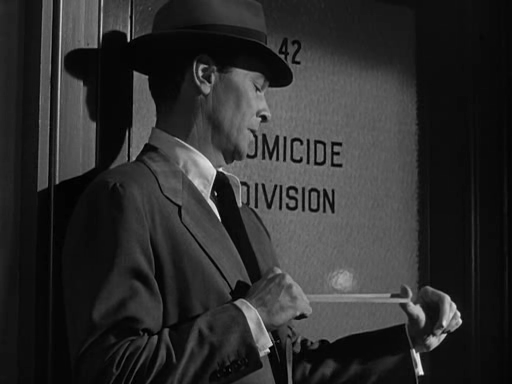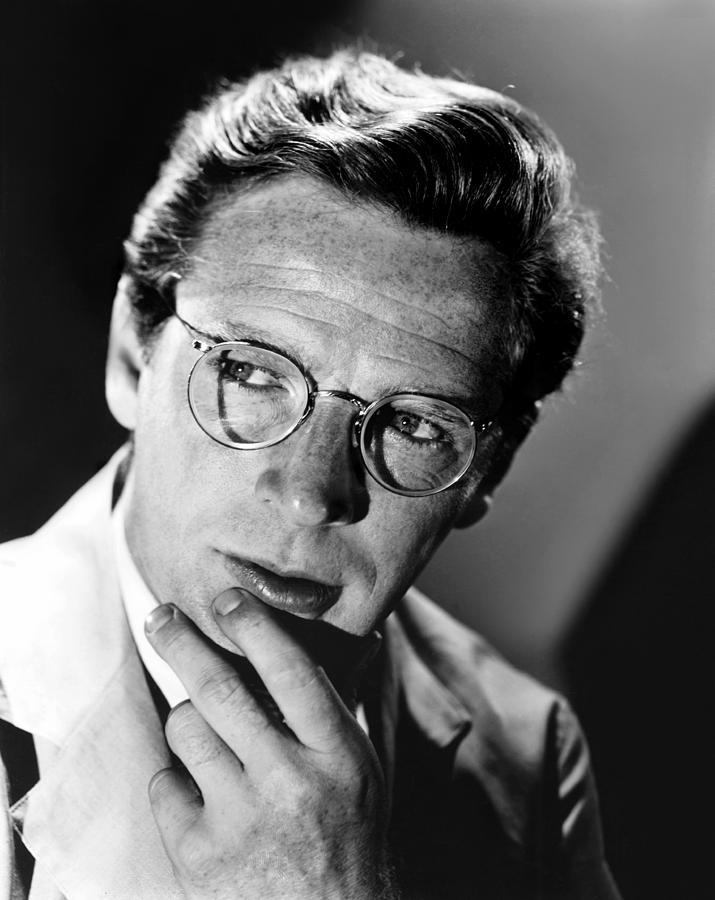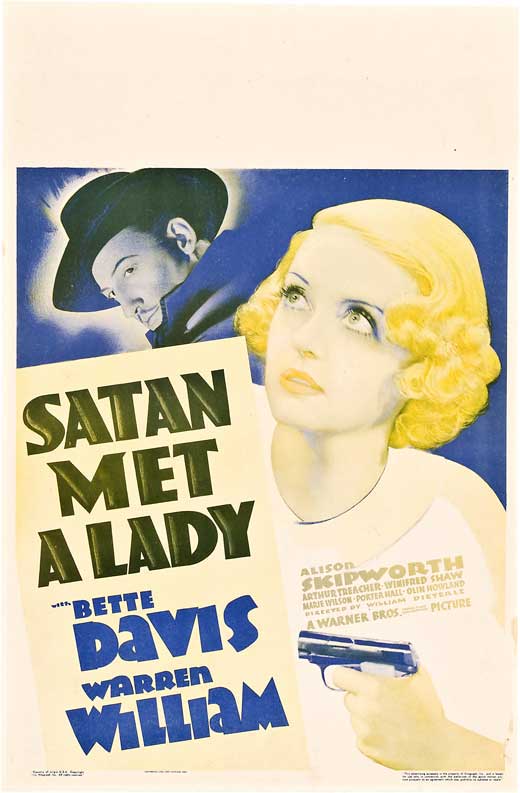 |
| It's very hard to find an image for this phrase not from a vampire movie. |
Honestly, calling either of today's films 'noir' is a bit of a stretch, and most likely a marketing ploy on the part of distributors VCI Entertainment, seeking a marketable hook with which to combine two 'social problem' melodramas based on stage plays. In point of fact, neither film is accurately titled on the DVD case; Twilight Women is actually Women of Twilight, according to the opening credits, and The Slasher was originally titled Cosh Boy, information that would certainly help anyone confused as to why no one in the film is slashed. From here on in, I will be referring to both films by their original titles.
Women of Twilight opens like a standard noir film, albeit one with a more pronounced feminine focus. After a credits sequence showcasing closeups of the main female characters, the film centers in on Vivianne(Rene Ray) dozing in a livingroom chair when she's awakened by two mysterious men knocking on the door. We never see the men, but she's clearly expecting trouble, for she shuts off the lights and sneaks out the backdoor. Vivianne meets up with her boyfriend, a nightclub singer whose apartment she was residing in. He admits to having killed someone, and is promptly hauled off by the police.
At this point, I thought I had the film pretty much figured out; Vivianne would begin investigating the murder while her boyfriend inched closer and closer to being executed. She'd discover some outrageous coincidence that proves her boyfriend was somehow innocent, just in time for a happy reunion at the end of the film. I could not have been more wrong. Women of Twilight drops its noir trappings as Vivianne finds a new home in a crowded boarding house, a haven for unwed mothers and other disgraced women(which Vivianne now is, since the press has prominently focused on her as the murderers live-in lover) who can find nowhere else to go. We even get a new main character in Chris Ralston, an unwed recent mother whose fiancee is working abroad. She can afford better lodgings, but in London in the 50s, her options would have been rather limited. A shared room in a crowded flat is pretty much the only thing available to her.
The most positive thing I can say about Women of Twilight is that, following so much misogyny in American noirs, it was refreshing to encounter a film this pro-feminism. It's not so much that the female characters in this film are all strong and capable- in fact most of them are depicted in rather unflattering lights- but that the film seems critical of the patriarchal social rules that have places all of these women in such desperate circumstances. The human villain of Women of Twilight is Nellie Alistair, who hides behind her false compassion as she works to keep these women marginalized and reliant on what she assure them is her selfless charity. In actuality, the real villain of the movie is the puritanical view of women that keeps these characters desperate and miserable.
The worst thing I can say about Women of Twilight is that it wallows in the miserablism of its subject matter. It's bleak almost to the point of caricature, and a quick rundown of the tragedies both minor and major suffered in this film would lead to chuckles rather than gasps. Petty theft, domestic violence, physical assaults on pregnant women, and crib death, just to name a few. The unceasing onslaught of unpleasantness eventually becomes numbing, so that it becomes neither enjoyable to watch, nor emotionally affecting.
That same sense of bleakness, endemic to a lot of British post-war art, is also present in Cosh Boy(a cosh is a British term for a bludgeon, or a blackjack), though not to the same heightened levels. The noir elements, conversely, are more prevalent in this film, though they're still very minor. Cosh Boy is, actually, a juvenile delinquency picture, just this side of being labeled an exploitation flick. The film follows Roy, the leader of a teenage gang who regularly bludgeon old women for their pocket change. Sentenced to probation for one such crime early in the film, Roy and his gang merely work out how to use the youth center they must volunteer at as a cover for further criminal acts.
Cosh Boy shares with Women of Twilight a sense of civic duty. Roy, the human villain of the piece, is meant to be a totem for a perceived societal ill, albeit one almost directly at odds with that of Women of Twilight. In Cosh Boy the societal ill isn't patriarchal, puritanical moral codes, the societal ill is that we aren't following those codes closely enough. In every example the film gives, the cause of teenage delinquency is lack of a father figure. Every member of the gang comes from a broken home, where, in most cases, the father was killed in the war. In Cosh Boy, no matter how well-meaning the mothers are, they can't do the job themselves without the aid of a man. A major subplot of the film concerns Canadian Bob Stevens' desire to marry Roy's mother, apparently out of a desire to fix Roy. His repeatedly stated goal is to wed Roy's mother so that he will be able to give Roy the physical beatings he should have been receiving daily like any upstanding member of society.
A young Joan Collins makes a very early film appearance as the sister of one of Roy's gang, back from boarding school. She's a very proper girl when we meet her, and Roy takes an instant liking to her. The film features one of those distasteful rape scenes from the 50s where the woman clearly doesn't want to have sex, but then at the last minute changes her mind. I think it's done in an effort to get past the censors(the stage play apparently was more explicit), but it's still a bit offputting. The film also features one of the most subtly vile visual metaphors for sex I've ever seen, as it cuts from a shot of the two embracing to a shot from within an alleyway where a sudden wind is blowing trash and detritus out into the streets. The sickness within Roy is spreading to proper, upstanding London society.
The deductive viewer will probably guess where this subplot is going, and sure enough, Rene becomes pregnant. When she reveals this to Roy, and informs him they must get married, he blows her off. Learning his mother has married Bob Stevens, Roy then plans and carries out a heist of the club that Bob works at, where he accidentally shoots a man in the course of the robbery. This is too much for the rest of his gang, who decide that they'll cut their losses and take whatever punishment is coming to them. Most of them are underage, anyway, and unlikely to face any serious penalty.
The end of the film finds Roy locked in his bedroom while an angry mob of women come for him after Rene attempts suicide, in which the baby is miscarried. Bob Stevens comes in, and removes his belt in order to 'thrash' Roy before the police come for him. This finale is a bit odd, as it attempts to add a humorous punchline to a film that has featured bludgeonings, rapes of underage girls, and subsequent miscarriages. As Bob is about to beat Roy, the police come in to arrest him. Seeing the belt, they announce they'll be back in ten minutes, and leave the apartment to the sound of Roy's screams as the crowd of women outside look on with approving smiles. The film attempts to convince us that regular abuse of children is enough to keep them on the straight and narrow, which doesn't ring true, as Roy's right hand man in the gang lived in a home where he was clearly beaten every day. Perhaps it has to be a man doing the beating, as a woman would simply send the wrong message.
In Women of Twilight the noir elements disappear from the film entirely after the opening scenes, and in Cosh Boy they pop up only occasionally. Both films have a nihilistic streak, and certainly many noir films have their share of bleakness. But in noir the bleakness is more baroque, the shadows heighten the theatricality of the scenes, while here they just pull everything down. In these two films the nihilism is earthier, more mundane and more terrible for it. Although the noir elements are muted, it's possible to see the smudged fingerprints of noir on the films, though I wouldn't make them required viewing for any but the most devoted acolytes of the genre.
.jpg/220px-%22Cosh_Boy%22_(1953).jpg)
.jpg)











